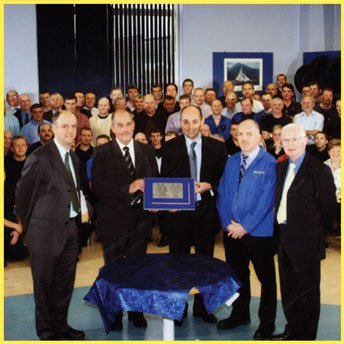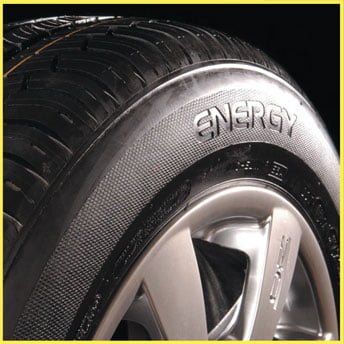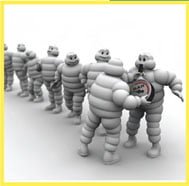
Michelin continues to be the world’s number one tyre manufacturer. The company has a unique and famous marketing emblem, ‘Bibendum’, more commonly known as the Michelin Man. As an international organisation, Michelin has a sales network in more than 170 countries.
In 2004, Europe represented 53% of sales. North America had 33% and Asia, South America and the Middle East and Africa Zone took 14%. Not surprisingly, Michelin has a turnover in excess of 15,689 billion euros and an operating margin of 8.3%. It employs around 127,000 people across all continents.
Michelin’s group mission is ‘to make a sustainable contribution to progress in the mobility of people and goods by constantly enhancing freedom of movement, safety, efficiency and pleasure when on the move’.
To achieve this mission, it seeks long-term growth by:
- remaining the leader in terms of innovation and differentiation in quality for tyres, suspension systems and related services
- satisfying customers’ needs by offering the best quality products and services at the best price in the markets Michelin decides to serve
- providing growth and fulfilment for Michelin employees
- targeting high value added and technologically sophisticated segments.
These aims are incorporated in Michelin’s ‘Performance and Responsibility’ approach.
As Managing Partner, Edouard Michelin says: ‘A company is not assessed only in terms of its fiscal results. It is also measured by its ability to develop its employees and take its place harmoniously in the communities and society around it.’
(See Michelin’s case study in edition 10 for more on the company’s objectives.)
What is a stakeholder?
Every business has people or groups of people who have an interest in what it does. These are called ‘stakeholders’. It matters to them what happens with a business and what a business does. The reasons for diverse ‘stakes’ in certain businesses differ – we shall see this in the case of Michelin.
Stakeholders should not be confused with shareholders. A shareholder is a part owner of a business, as he or she has bought a part of its value. Shareholders can have a say in what the business does. They share in risks as well as successes.
Shareholders are also stakeholders in Michelin, as they are in all businesses. However, not all stakeholders are shareholders. Considering the various stakeholders in Michelin, there is a range of different ‘stakes’ held by people and groups:
- customers (whether another business or an individual)
- Michelin employees
- governments local to Michelin sites
- financial institutions
- communities where Michelin operates
- various pressure groups (eg Friends of the Earth).
We will now look at some of these and see how this global business works to build stakeholder values.

Customers and employees
Customers

Michelin sells tyres to two markets:
- vehicle manufacturers
- users, through an intermediate customer, for example distribution channels such as ATS Euromaster.
Within the tyre markets, customers’ expectations fall into five main categories for which significance or priority will vary from one customer to another:
- improved safety
- lower cost per mile or per tonne transported
- ability to reach one’s destination comfortably and reliably
- increasing environmental-friendly tyres
- availability of product support services to accompany and facilitate mobility.
The fulfilment of customer needs is a on-going priority for Michelin. This involves anticipation of the best solutions for the future, remaining attentive and open minded. The Company maintains a solid and honest relationship with its customers by providing them with precise and reliable information. Respect for clients is one of Michelin’s basic and traditional values.
The business has to take into account the requirements of vehicle manufacturers. With 4,000 research engineers in three continents, Michelin uses its expertise in tyres and vehicles, working closely with vehicle designers and engineers. It forms ‘strategic partnerships’ to co-develop, for example, Tyre Pressure Monitoring Systems (TPMS) for cars, trucks and earthmovers.
Michelin does not just deal in tyres, however. The company offers services along the supply chain. These help distributors and other partners add value to their activities. Michelin also produces guides, maps, on-line route planning (Via Michelin), breakdown services (Michelin Euro Assist) and lifestyle products (Michelin Lifestyle) to improve mobility for individuals throughout the world.
Employees
Few stakeholders are as vital in a business as its workers. A worldwide company has to invest a great deal to respect all staff interests.
Staff have a big interest in the success of the company. Every worker hopes to have a secure future. Offering great customer service depends on Michelin’s people. It therefore places respect for its people at the heart of its values. This involves some key policies relating to staff.
Part of the daily task of Michelin managers is to care for the career path of each member of staff. With a low turnover rate of less than 2% of voluntary departures in 2003 and 2004, employees have real regard for these values. Throughout their career, Michelin staff enjoy active training. In 2004, 53% of the Group’s employees had access to at least one course.
Michelin has an ‘Employee Stock Ownership Plan’. This allows employees to become shareholders. The plan was offered to employees in 16 countries across Europe. 69% took up the chance. This plan is unravelling all over the world. This further identifies company loyalty with the values of staff. If Michelin succeeds, its staff succeed.
Michelin is a global business. To enable the company to know its customer needs and better understand the markets in which it acts, it makes sure all diverse talents are able to express themselves within the company, resulting in improved global performance for the Michelin Group.
Michelin has made diversity management a priority. A multi-cultural environment is just one element of the company’s diversity programme and their European Finance Centre, which opened in Manchester in 2002, successfully demonstrates this aspect. It has a staff of 250, including 24 European nationalities, centralising the financial operations of currently 15 Western European countries. Michelin also has a Diversity Council. The aim is to steer the processes to enable each employee to express the specific nature of his or her individual talent. Having women at managerial level is also a part of this effort.
To encourage progress in work safety, Michelin has organised an annual Safety Challenge for all its industrial plants and rubber plantations since 2003. By using key indicators: frequency rate and severity rate, objectives can be set and results measured and compared across the world. In 2004 the UK plant at Dundee succeeded in winning the award for experiencing zero accident-related lost work days during the year.
At Michelin, the aim today is to prevent employee injury or illness. A worker must be happy in his or her work. Michelin has embarked on a plan of monitoring workstations. By helping workers to work more at ease, productivity improves. This creates a ‘win-win’ situation. A happier, healthier and safer worker is a more effective worker.
Respect for the health and well-being of every worker, wherever they are, is at the core of Michelin’s values. Health screening and prevention of illness has improved. Michelin has a group doctor to manage the process. Where the existing medical infrastructure is insufficient Michelin will provide the means to improve it. For example, in 2003, the company provided the Davydovo hospital in Russia with equipment for blood analysis, heart checks and respiratory testing. In some parts of Africa, Michelin offers both screening and AIDS awareness programmes.
Company shareholders

In late December 2004, Michelin had 2,584 institutional shareholders and 188,947 individual shareholders. All were registered with the company by name. The economic well-being of Michelin is a prime concern of its shareholders. They need a return on the cash they invest. They not only seek to share in the success of the business, but they share in the risks too.
If something happened that cost Michelin money, shareholders would pay the cost. Michelin’s global management takes their interests very seriously. The company has adopted many ‘principles of action’ that govern its shareholder relationship.
The first principle is to drive for profits. By achieving financial success, the company can further develop. However, Michelin knows it must also care for the environment and for the people of the world and the societies they live in. Michelin sees these things as all linked.
Michelin knows that shareholders need information from the company. Therefore, there is regular, accurate and honest contact between it and its shareholders. There is an ‘Investors Relations Department’. This ensures the company has a common approach to the range of investors. There is also a ‘Shareholder Consultative Committee’. The website – www.michelin.com – has a shareholders’ space with all the relevant documents. There is a CD-ROM for them too.
The wider community, society and the environment

World leaders have become very aware of the concerns about the planet we depend upon. Pollution is a danger to all nations. The pressure is therefore on global businesses such as Michelin. National and world agencies are demanding more. The whole world is a stakeholder in the actions of Michelin.
The company takes great care to assess the business’ ‘environmental footprint’. It produces the world’s first ‘green tyre’. Through research and development, Michelin has focused great efforts on improving the impact of its tyres. By making improved types, Michelin adds to better fuel economy. By making longer-lasting ones, there is less drain upon natural resources. This applies in all markets.
At the end of a tyre’s life span, what happens to the waste product? Michelin has found that used tyres are a secondary resource. They can be usefully recycled. Michelin works with other firms to develop sustainable recycling networks.
At every stage in the supply chain, Michelin works to reduce the ecological impact of its operations. For instance, 90% of the Group’s production in tonnage was produced in ISO-14001 certified plants in 2004.
For all societies, safety of pedestrians and road users is a government issue. Michelin was the first tyre manufacturer to sign the European Charter for Safety because it shares such concerns. Between 2004 and 2010 the mutual aim is to reduce the number of deaths on European roads by 50%.
One way Michelin contributes to this objective is with its ‘Fill Up With Air’ events held every year in at least 20 European countries. This initiative raises drivers’ awareness of the importance of regular tyre pressure checks on road safety. These social and wider concerns affect us all. It is vital that Michelin not only acts, but also is hands-on in teaching everyone. Whether we are speaking of pollution and global warming, or safe road use and car performance, Michelin tries to engage with everyone.
Conclusion

At the heart of all of Michelin’s activities lies respect for the needs of the diverse categories of stakeholders.
The Michelin thinking is simple – success is dependent upon meeting the wishes of stakeholders. The company view is that these interests are interconnected. By doing the right thing by stakeholders, the company will achieve its objectives.
